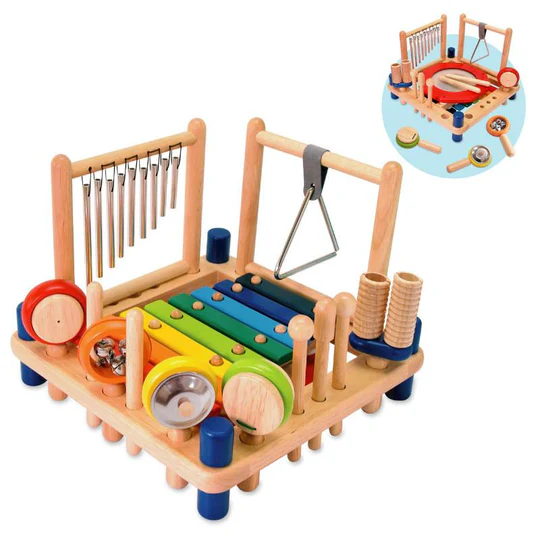Musical Toys: A Fun and Educational Tool for Children
Musical toys are not just for fun—they are an essential tool for fostering cognitive, emotional, and physical development in children. By integrating music into playtime, parents can encourage creativity, improve coordination, and support overall growth. Whether you’re introducing your baby to their first instrument or helping your toddler discover their rhythm, musical toys provide a world of benefits. Let’s take a closer look at why musical toys should be an important part of your child’s learning environment.
Why Choose Musical Toys for Your Child?
Investing in musical toys can make a significant impact on your child’s development. Here’s why these toys are more than just playthings:
1. Cognitive Development
One of the primary benefits of musical toys is their role in developing cognitive skills. Music enhances memory, attention span, and problem-solving abilities. Instruments such as xylophones, keyboards, and drums help children recognize patterns, improve their understanding of cause and effect, and enhance their memory as they learn to repeat and recognize songs or rhythms.
2. Motor Skill Improvement
From tapping to strumming, musical toys encourage the development of fine motor skills and hand-eye coordination. When children play with drums, tambourines, or even shake maracas, they are strengthening their muscles and learning how to control their movements. These activities promote better hand coordination and help improve their motor skills, which are crucial for daily activities and learning.
3. Language Skills and Communication
Children can also benefit from musical toys in terms of language development. Singing along with songs, mimicking sounds, or even creating their own tunes can help children with pronunciation, language comprehension, and social interactions. By listening to music and identifying rhythm and beats, kids develop auditory discrimination, an essential skill for language learning.
4. Emotional Expression and Confidence
Music provides a unique outlet for emotional expression. Musical toys allow children to explore their feelings and communicate them through sound. When children play instruments, they can experiment with various emotions, whether it’s the joy of a fast-paced song or the calmness of a lullaby. This promotes self-confidence and emotional intelligence, as they learn how to manage their emotions in a fun and creative way.
Types of Musical Toys for Different Ages
No matter the age of your child, there’s a musical toy that suits their developmental stage. Here are a few examples:
1. Infant and Toddler Musical Toys
For babies and toddlers, musical toys that are easy to use and safe are essential. Instruments like baby pianos, maracas, and drumsticks are perfect for little ones. These toys help them develop an interest in sound and music, all while improving motor skills. At this age, music often helps soothe children and provides a sense of calm during playtime.
2. Preschool Musical Toys
As children grow older, they begin to explore more complex rhythms and melodies. Preschoolers may enjoy playing instruments like small keyboards, tambourines, or even a small ukulele. These toys help them experiment with rhythm and melody while improving their hand-eye coordination. Additionally, they may start to recognize patterns in music, which aids in memory and learning.
3. School-Age Musical Toys
For older children, musical toys can become more sophisticated. At this stage, children may enjoy learning how to play more intricate instruments like guitars, electric keyboards, or drum sets. These toys provide them with the opportunity to learn more advanced music theory, such as reading music, playing chords, and developing musical creativity.
Benefits of Musical Toys for Early Childhood Development
Beyond fun and entertainment, musical toys offer a wide range of developmental benefits for children:
1. Enhanced Creativity
Music is a universal language that allows children to express themselves creatively. With musical toys, children can create their own songs and rhythms, fostering imagination and problem-solving skills. This creative freedom helps children think outside the box and experiment with new ideas.
2. Improved Concentration
Playing with musical toys requires focus and attention, which enhances a child’s ability to concentrate. Whether they’re following along to a melody or practicing new musical skills, kids learn how to stay engaged and develop patience.
3. Social Interaction
When children play together with musical toys, they learn important social skills such as sharing, turn-taking, and teamwork. Music brings people together, and children who play in groups can experience the joy of creating music together while learning how to interact with others.
Where to Buy Musical Toys in the Philippines
If you’re looking to purchase high-quality musical toys, look no further than Crane Philippines. Crane Philippines offers a wide variety of musical toys for children of all ages, from infant toys to instruments designed for budding musicians. Whether you’re shopping for a gift or looking to expand your child’s musical collection, you can find the perfect option at Crane Philippines.
Conclusion
Musical toys are more than just a source of entertainment—they are powerful tools for early childhood development. By incorporating these toys into your child’s playtime, you are helping them develop crucial cognitive, emotional, and motor skills. Musical toys not only encourage creativity and imagination but also provide opportunities for learning, social interaction, and self-expression. Start your child’s musical journey today and watch them grow, learn, and thrive!
Visit Crane Philippines today to explore their wide range of musical toys, and find the perfect instrument for your child!




